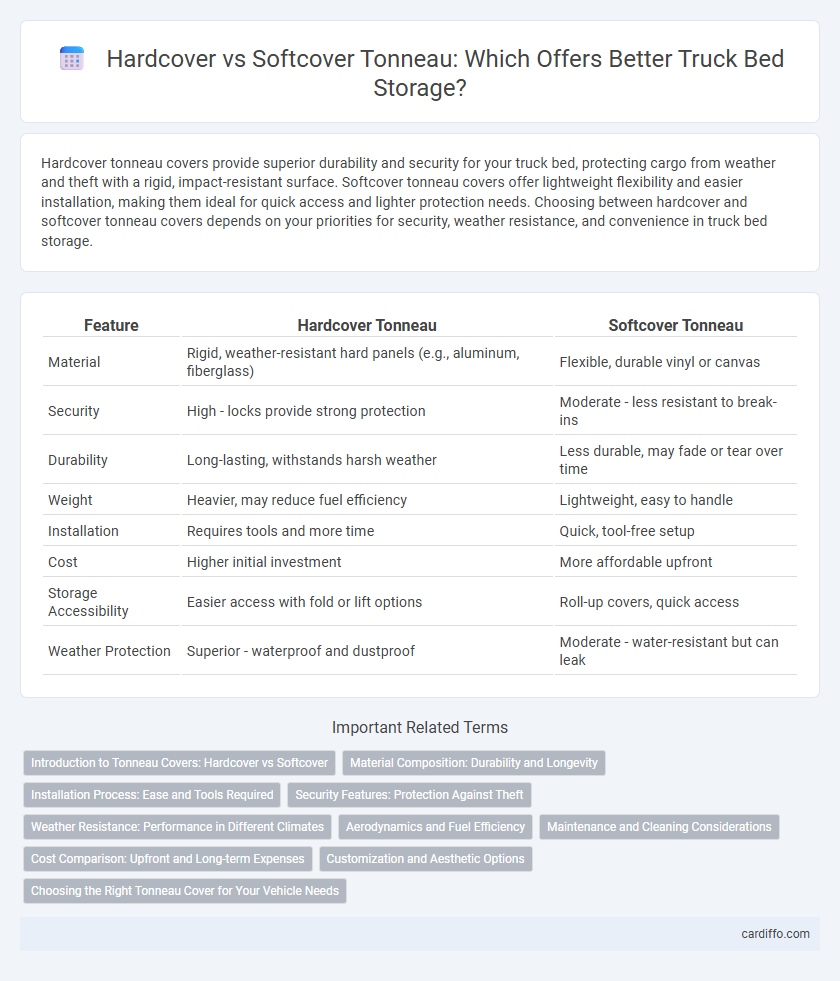Hardcover tonneau covers provide superior durability and security for your truck bed, protecting cargo from weather and theft with a rigid, impact-resistant surface. Softcover tonneau covers offer lightweight flexibility and easier installation, making them ideal for quick access and lighter protection needs. Choosing between hardcover and softcover tonneau covers depends on your priorities for security, weather resistance, and convenience in truck bed storage.
Table of Comparison
| Feature | Hardcover Tonneau | Softcover Tonneau |
|---|---|---|
| Material | Rigid, weather-resistant hard panels (e.g., aluminum, fiberglass) | Flexible, durable vinyl or canvas |
| Security | High - locks provide strong protection | Moderate - less resistant to break-ins |
| Durability | Long-lasting, withstands harsh weather | Less durable, may fade or tear over time |
| Weight | Heavier, may reduce fuel efficiency | Lightweight, easy to handle |
| Installation | Requires tools and more time | Quick, tool-free setup |
| Cost | Higher initial investment | More affordable upfront |
| Storage Accessibility | Easier access with fold or lift options | Roll-up covers, quick access |
| Weather Protection | Superior - waterproof and dustproof | Moderate - water-resistant but can leak |
Introduction to Tonneau Covers: Hardcover vs Softcover
Hardcover tonneau covers provide superior protection against weather elements and theft due to their rigid construction, often made from materials like fiberglass or aluminum. Softcover tonneau covers, typically crafted from vinyl or canvas, offer lightweight flexibility and easier installation but may compromise on durability and security. Choosing between hardcover and softcover tonneau covers depends on the balance between protection needs, budget, and ease of use for truck bed storage solutions.
Material Composition: Durability and Longevity
Hardcover tonneaus are constructed from rigid materials such as fiberglass or aluminum, offering superior durability and resistance to weather elements, scratches, and impacts, which enhances longevity significantly. Softcover tonneaus typically use vinyl or canvas with lightweight frames that, while flexible and easier to install, are more prone to wear, tearing, and UV damage over time. The choice between hardcover and softcover tonneaus impacts the level of protection and lifespan depending on the environmental exposure and usage frequency.
Installation Process: Ease and Tools Required
Hardcover tonneau covers typically require a more complex installation process involving precise alignment, specialized clamps, and occasional drilling, which may necessitate additional tools like torque wrenches. Softcover tonneau covers generally offer easier installation, using simple clamps or Velcro straps and requiring minimal tools, making them user-friendly for most truck owners. The choice between hardcover and softcover covers often depends on the user's comfort level with installation complexity and the availability of specific tools.
Security Features: Protection Against Theft
Hardcover tonneau covers provide superior security features by using durable materials such as aluminum or fiberglass, effectively preventing unauthorized access and protecting cargo from theft. Softcover tonneau covers, typically made from vinyl or fabric, offer less reliable protection due to their susceptibility to cutting or tampering. The rigid construction of hardcover covers enhances vehicle security by offering tamper-resistant locks and a more formidable barrier against potential thieves.
Weather Resistance: Performance in Different Climates
Hardcover tonneau covers provide superior weather resistance with durable materials like fiberglass or hard plastic, effectively protecting cargo from rain, snow, and UV rays in harsh climates. Softcover tonneau covers, made from vinyl or fabric, offer moderate protection but may allow water seepage under heavy rainfall or snow accumulation, making them less ideal for extreme weather conditions. In humid or rainy regions, hardcovers prevent moisture buildup and corrosion better than softcovers, enhancing long-term cargo protection.
Aerodynamics and Fuel Efficiency
Hardcover tonneaus offer superior aerodynamics by providing a sleek, rigid surface that minimizes air resistance, which can improve fuel efficiency on highways. Softcover tonneaus, while flexible and lightweight, may create turbulence due to flapping or loose edges, potentially increasing drag and reducing mileage. Choosing a hardcover tonneau can lead to measurable fuel savings, especially during long-distance driving or at higher speeds.
Maintenance and Cleaning Considerations
Hardcover tonneau covers require less frequent cleaning due to their durable, weather-resistant materials that repel dust and debris more effectively than softcovers. Softcover tonneaus, typically made from vinyl or fabric, demand regular maintenance, including cleaning and conditioning to prevent mold, mildew, and UV damage. Maintaining a hardcover involves occasional washing with mild soap, whereas softcovers need more careful upkeep to preserve flexibility and appearance over time.
Cost Comparison: Upfront and Long-term Expenses
Hardcover tonneau covers typically have a higher upfront cost, ranging from $300 to $1,000, but offer greater durability and weather resistance that can reduce long-term maintenance expenses. Softcover tonneau covers are more affordable initially, often priced between $100 and $400, yet may require more frequent replacement or repairs due to material wear and tear. When evaluating total cost of ownership, hardcover covers provide better value over time for those seeking investment in longevity and protection.
Customization and Aesthetic Options
Hardcover tonneau covers offer extensive customization options, including painted finishes and sleek designs that enhance vehicle aesthetics while providing robust protection. Softcover tonneaus provide flexible configurations with numerous fabric colors and textures, allowing users to tailor the look for a sporty, casual style. Choosing between the two depends on desired durability and personalized visual appeal to match the vehicle's overall theme.
Choosing the Right Tonneau Cover for Your Vehicle Needs
Hardcover tonneau covers offer superior security, weather resistance, and durability, making them ideal for protecting valuable cargo in harsh conditions. Softcover tonneau covers provide flexible, lightweight storage solutions that are easier to install and remove, suitable for frequent access and lighter protection needs. Selecting the right tonneau cover depends on balancing factors like protection level, ease of use, vehicle type, and budget to meet your specific storage requirements.
hardcover tonneau vs softcover tonneau Infographic

 cardiffo.com
cardiffo.com